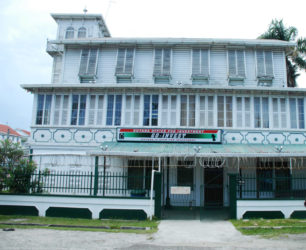Private Sector Commission (PSC) believes that the Guyana Office for Investment (GO-Invest) is ill-equipped to effectively execute its mandate at this time and is unlikely to be able to do so unless it becomes free to attract its own international funding.
“A modern investment agency needs more money, more reach and offices outside of Guyana,” the PSC said.
However, the local business support organization (BSO) has expressed its support, in principle, for the role of state investment promotion agency, adding that the private sector had begun to pursue collaborative initiatives with GO-Invest. “We have started to co-host investors with GO-Invest and these have proven very successful,” the PSC said.
In its communication with the Stabroek Business, the PSC said that while it sees “much room for improvement” in the process of creating a convivial investment climate, it believes “investors are facilitated in Guyana and are warmly welcomed by GO-Invest and other government agencies. If we have the opportunity investors will follow.”

The BSO said it wants to see less emphasis on interface between investors and politicians and more exchanges with specialized state agencies established to facilitate investment. “Somehow investors feel that they must meet with ministers when they come to Guyana. We need to empower our institutions to make decisions in keeping with laws and stated policies. We need to have several sets of different business plans done that can be placed on the web for sale so that persons understand what can be invested in, in Guyana,” it stated.
Meanwhile, the PSC said that the country’s 2004 Investment Act was responsible for the creation of “a level playing field for both foreign and local investors” while Guyana boasts “comparative advantages in the abundance of land, low wages and trainable work force.”
At the same time, according to the PSC, “Investors are also swayed by the country’s proximity to both the South American and Caribbean markets, especially to the large Brazilian market.” These requisites notwithstanding, the BSO said the necessary investment can only materialize in the face of “a well-articulated incentive regime,” which must be “sufficiently clear as to provide a degree of certainty for investors that the rules of the game will not be changed after they have invested significant sums.”
The PSC’s responses to the questions posed by this newspaper included an endorsement of the government’s economic diplomacy push which involves, among other things, the collaborative pursuit by local state agencies, Guyana’s diplomatic missions abroad and the private sector, of initiatives designed to further attract overseas investment to Guyana and to strengthen bilateral and multilateral ties that can support Guyana in pursuit of its economic goals. “We see our job as driving this initiative with individual ambassadors who we have met with and are already in contact with the ones that have been posted. The ambassadors with whom we have met have all pledged to remain in contact with the Private Sector Commission and to channel information which could lead to new markets and other economic benefits for Guyana’s private sector,” the PSC said in its response.
Mooted under the Hoyte administration, as well as the subsequent PPP/C government, economic diplomacy envisages a collaborative effort involving the country’s diplomatic missions abroad, local state agencies and the private designed to attract foreign investment to Guyana and to create bilateral and multilateral partnerships that can build the country’s economy. Its principal failing has been the fact that the country’s foreign service structure has been fashioned largely to pursue political rather than economic diplomacy and is still to make the requisite human resource adjustments.
In what was one of its most elaborate public disclosures on the status of relations between itself and the Government of Guyana since the 2015 general elections, the PSC said that it had participated in a meeting with Foreign Affairs Minister Carl Greenidge and his staff “where the minister stressed the concept of economic diplomacy…” It added that in that regard the local private sector saw “big opportunities in Cuba and some Caribbean islands.” However, its submission gave no clear hint as to likely time frame for a broader engagement with the government.





